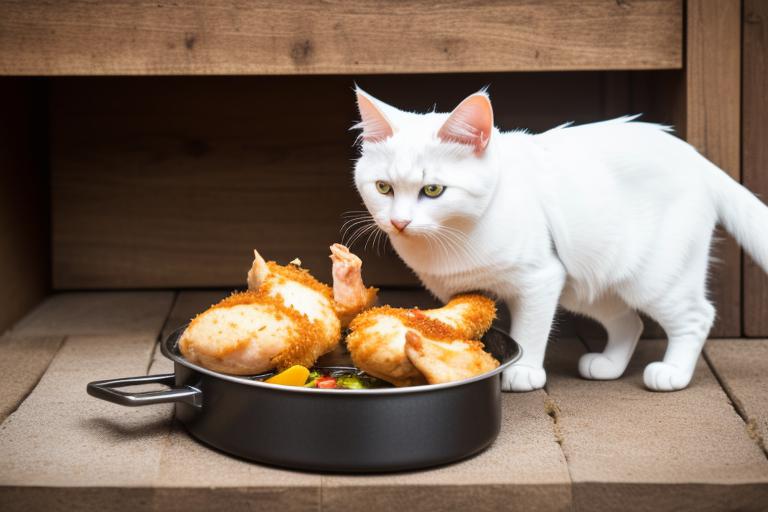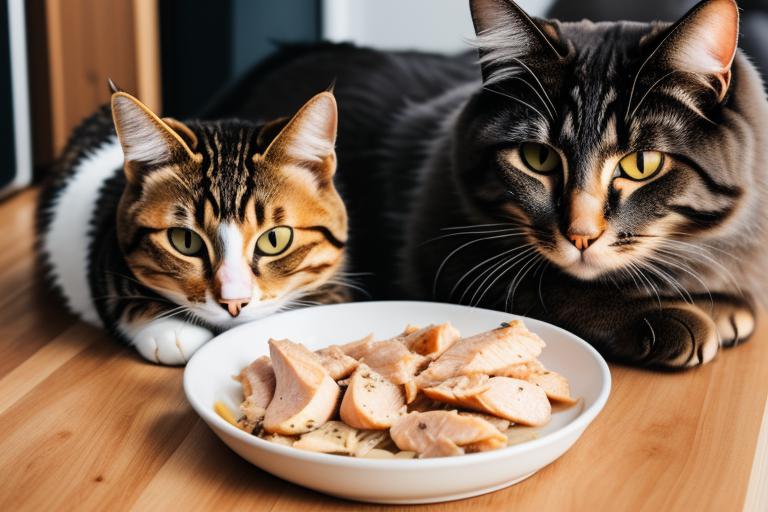Are you curious about whether cats can indulge in some delicious cooked chicken? Well, you’re not alone.
Many cat owners wonder if it’s safe to share this popular human food with their feline friends. While cats are obligate carnivores and thrive on a meat-based diet, it’s essential to understand the potential benefits and risks of feeding them cooked chicken.
So, let’s dive into this topic and uncover whether your cat can savor the flavors of cooked chicken or if it’s best to stick to their regular feline fare.
Nutritional Benefits of Cooked Chicken for Cats

Cooked chicken provides numerous nutritional benefits for cats. It’s a great source of protein, which is essential for the growth and maintenance of their muscles. Protein also helps in the development of healthy skin and fur. In addition, cooked chicken contains essential amino acids that cats need for optimal health.
Another benefit of cooked chicken for cats is its high moisture content. Cats are notorious for not drinking enough water, so incorporating cooked chicken into their diet can help keep them hydrated. The moisture in the chicken also aids in digestion and prevents constipation.
Cooked chicken is also low in carbohydrates, which is ideal for cats as they’re obligate carnivores. Their bodies are designed to obtain energy from animal-based proteins rather than carbohydrates. Feeding them cooked chicken can help maintain their natural diet and prevent obesity.
Furthermore, cooked chicken provides cats with important vitamins and minerals. It contains vitamin B6, which supports brain function and helps regulate hormones. It also contains minerals like iron, zinc, and magnesium, which contribute to overall health and wellbeing.
Potential Risks of Feeding Cats Cooked Chicken
Feeding cats cooked chicken may pose potential risks to their health. While cooked chicken can be a tasty and protein-rich treat for cats, there are a few things to consider before making it a regular part of their diet.
One potential risk is the seasoning or additives that are commonly used when cooking chicken. Ingredients like onions, garlic, salt, and certain herbs can be toxic to cats and may cause gastrointestinal upset or even more serious health issues. It’s important to avoid using any seasonings or marinades that may be harmful to your feline friend.
Another risk is the method of cooking. Some cooking methods, like frying or grilling, can add excess fat to the chicken, which can be harmful to cats, especially if they’ve pre-existing health conditions such as obesity or pancreatitis. Feeding your cat chicken that has been cooked using healthier methods, like boiling or baking, can help reduce the risk of consuming too much fat.
Lastly, it’s crucial to ensure that the chicken is fully cooked to eliminate the risk of bacterial contamination, such as Salmonella or Campylobacter. These bacteria can cause food poisoning in cats and lead to symptoms like vomiting, diarrhea, and lethargy. Always make sure the chicken is cooked thoroughly before offering it to your cat.
How to Prepare Cooked Chicken for Cats
To prepare cooked chicken for your cat, start by removing any seasoning or additives that may be harmful to their health. Cats have sensitive digestive systems, so it’s important to provide them with plain, unseasoned chicken.
Here are three easy steps to prepare cooked chicken for your feline friend:
- First, remove the skin from the chicken. While it may be tempting to leave it on for added flavor, the skin can be high in fat and may cause digestive issues for your cat.
- Next, make sure to remove any bones from the chicken. Cats can easily choke on small bones, and larger bones can cause serious internal injuries. It’s best to shred or chop the chicken into small, boneless pieces.
- Finally, ensure that the chicken is cooked thoroughly. Raw or undercooked chicken may contain harmful bacteria, such as salmonella, which can make your cat sick. Cook the chicken until it reaches an internal temperature of 165°F (74°C) to eliminate any potential health risks.
Recommended Portion Sizes for Cats Eating Cooked Chicken
For cats eating cooked chicken, it’s important to consider the recommended portion sizes. Feeding your cat the right amount of cooked chicken ensures that they receive the necessary nutrients without overeating. Remember, moderation is key.
The recommended portion size of cooked chicken for cats depends on their weight and activity level. As a general guideline, a healthy adult cat weighing around 10 pounds should be fed about 1 to 2 ounces of cooked chicken per meal. This can be divided into two meals per day. However, it’s always best to consult with your veterinarian to determine the specific portion size that’s suitable for your cat.
It’s important to note that cooked chicken should only supplement your cat’s regular diet, not replace it entirely. Cats require a balanced diet that includes other essential nutrients such as vitamins, minerals, and taurine. Therefore, cooked chicken should be offered as a treat or a protein source in addition to their regular cat food.
Monitoring your cat’s weight and adjusting portion sizes accordingly is crucial to maintain their overall health. Overfeeding cooked chicken or any other food can lead to obesity and other health issues. Always prioritize your cat’s well-being and follow the recommended portion sizes to keep them happy and healthy.
Alternatives to Cooked Chicken for Cat’s Diet
If you’re looking for alternatives to cooked chicken for your cat’s diet, there are several options to consider. While cooked chicken can be a healthy and tasty treat for your feline friend, it’s important to provide variety in their meals to ensure they get all the necessary nutrients.
Here are a few alternative protein sources that you can incorporate into your cat’s diet:
- Fish: Cats are natural hunters, and fish provides a great source of protein and omega-3 fatty acids. Opt for fish like salmon or tuna, but make sure it’s cooked thoroughly and deboned to avoid any potential health risks.
- Turkey: Like chicken, turkey is a lean meat that can be a good source of protein for your cat. It’s important to remove the skin and bones before feeding it to your furry friend to prevent any choking hazards.
- Beef: Cooked beef can also be a suitable alternative for your cat’s diet. Make sure to choose lean cuts and remove any excess fat. It’s best to cook it thoroughly and cut it into small, manageable pieces for your cat.
Frequently Asked Questions
You can feed your cat raw chicken instead of cooked chicken, but it’s important to note that raw meat can pose health risks for cats. Consult with your veterinarian to ensure your cat’s dietary needs are being met.
Feeding your cat chicken bones is not safe. They can splinter and cause injury or blockages. Stick to boneless cooked chicken to ensure your cat’s safety and well-being.
Yes, cats can eat chicken skin in small amounts. However, it is important to remove excess fat and seasoning as it may cause digestive issues. Moderation is key to avoid any potential health problems.
Yes, cats can eat cooked chicken. However, it’s important to avoid using any seasonings or spices that may be harmful to them. Stick to plain, unseasoned chicken to ensure their safety.
You can feed your cat cooked chicken every day as their main source of food, but it’s important to ensure they’re getting a balanced diet with all essential nutrients. Consult a veterinarian for guidance.
Conclusion
In conclusion, cooked chicken can be a beneficial addition to a cat’s diet, providing essential nutrients and protein. However, it’s important to be cautious of potential risks such as bones and seasoning.
When preparing cooked chicken for cats, ensure it’s boneless, skinless, and free from any seasonings or additives. Portion sizes should be appropriate for their size and weight.
If cooked chicken isn’t suitable or available, there are other alternatives that can meet a cat’s nutritional needs.

